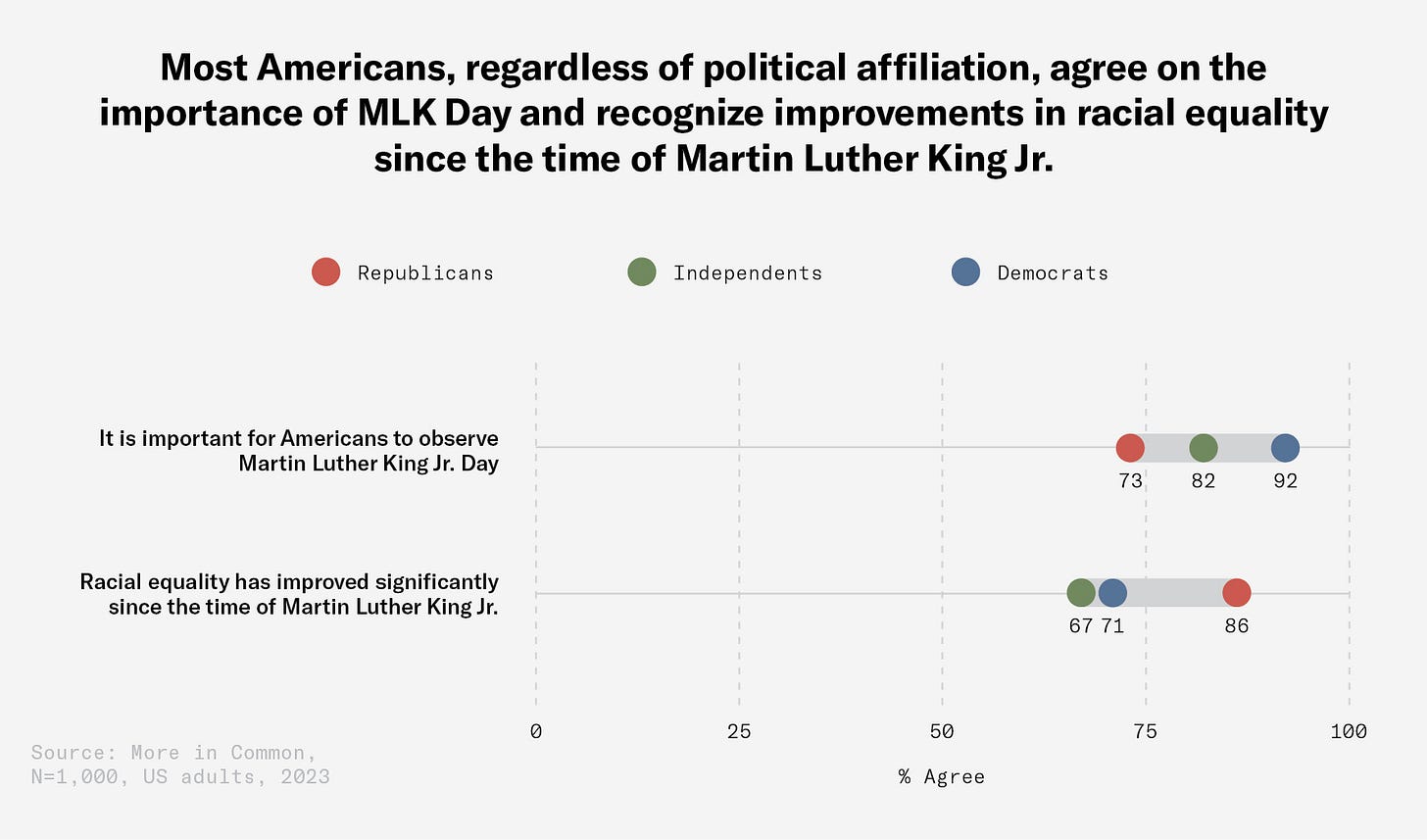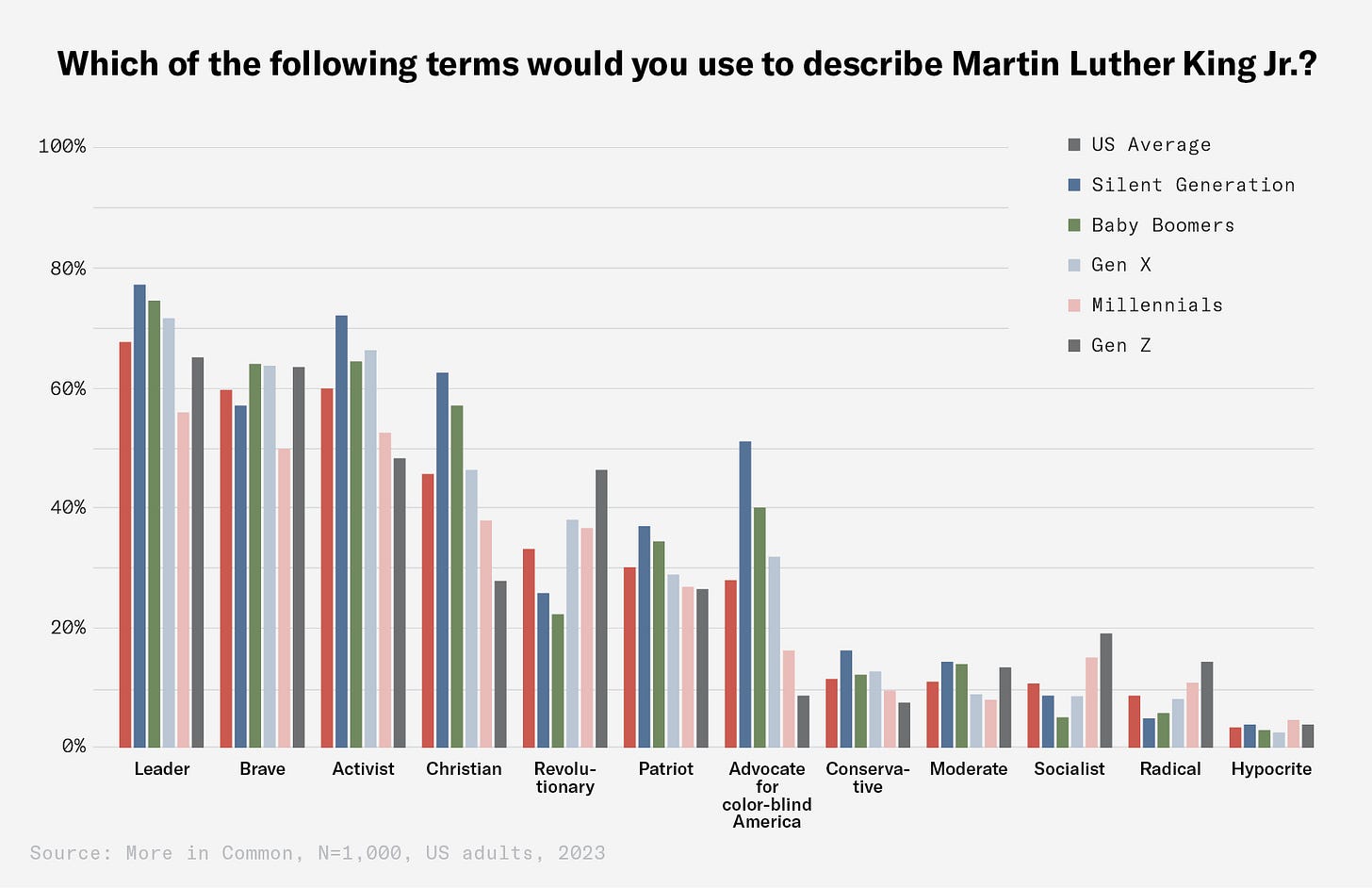Report: Dr. Martin Luther King Jr. Highly Regarded as a "Leader, Brave, and Activist"
Summary: Our latest survey “Americans’ views of MLK Day” found most Americans value and respect Dr. King and that racial equality has improved since the 1960’s.
More than half a century since his death, Americans across generations, race, and political ideology regard Dr. King as a brave leader and activist and agree that it’s important to observe MLK Day.
In our latest report, “Americans’ views of MLK Day” 92% of Democrats, 82% of Independents and 71% of Republicans agreed that “it is important for Americans to observe MLK Day.” Additionally, 82% of Republicans, 67% of Independents and 72% of Democrats believe racial equality has “improved significantly since the time of Dr. Martin Luther King.”
Although there is general agreement across both parties on the questions above, Democrats and Republicans fail to recognize this common ground. We call this a perception gap—the difference between what we imagine an opposing group believes and what that group actually believes. While most Republicans (73%) think it’s important to observe MLK Day, Democrats think only 38 % of Republicans feel this way.
Conversely, Republicans think only a minority (45%) of Democrats believe that racial equality has improved since Dr. King’s time compared to the 71% of Democrats who say they recognize racial equality has improved.
This resonates with our latest report “Defusing the History Wars” which found that Republicans and Democrats have a flawed and inaccurate perceptions of what the other thinks when it comes to American history. These perception gaps have potential to lead to situations where communities spend time fighting imagined enemies instead of grappling with the substance where there is actual conflict.
Listen to people’s perspectives on U.S. history here.
Americans’ Views of Dr. King
When it comes to how Americans view Dr. King, the majority used the words “leader,” “brave” and “activist” to describe him. However, differences emerge across generations: Gen Z were the most likely to refer to him as “revolutionary,” while the Silent Majority view Dr. King as a “Christian” and an “advocate for a color-blind America.”
Black Americans, Democrats, and Gen Z were most likely to say they will observe the holiday. The most commonly cited ways Americans say they plan to observe the holiday are by listening to a speech by Dr. King, supporting black-owned businesses, and/or watching a movie about Dr. King or the civil rights era.
National holidays like MLK Day provide an important opportunity to pause and reflect on the leaders and significant events that have played a role in shaping our national story and identity
Dr. King said, “We are not makers of history. We are made by history.”
Dr. King’s steadfast pursuit of equality while navigating an environment of polarization and intense division is inspiring. His legacy and contributions continue to provide us hope and serve as a model for how to forge a path to a more united future. Let us use this day as an opportunity to reflect on how our own actions can continue to develop his vision of a more inclusive and equitable country.
📊 Read our full report on Americans’ attitudes on MLK Day here.
🗯 Want to join the conversation and learn more about our reports “Americans’ Views on MLK Day” and “Defusing the History Wars”? Sign up for our virtual Q&A with the lead researchers this Thursday, January 19 at 2 p.m EST.
We are hiring!
Love data as much as we do? Join our team! More in Common is hiring for two new research positions. The application deadline is February 10. Descriptions/application instructions are as follows:
👉 Senior Researcher (Full-Time): This role is for a mission-driven individual with extensive research and managerial experience. The Senior Researcher will work closely with the US Director and Director of Research to design, execute, analyze and present research that aims to better understand the American public as well as defuse political polarization and strengthen social cohesion. The full job description is here.
👉 2-3 Research Fellows (Part-Time): The paid fellowship is for advanced PhD students interested in conducting applied research relating to either social cohesion; social contact theory; pro-social norms, behaviors, and emotions; communications in a polarized context; and/or political polarization. The fellowship will start in late May/early June and continue through the end of 2023. The full fellowship description is here.





